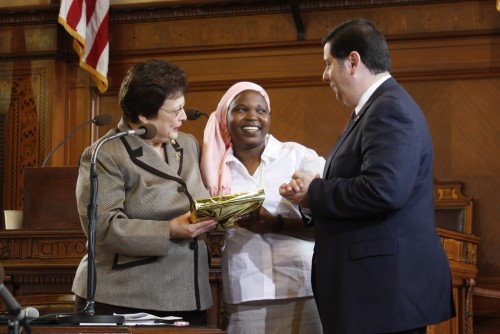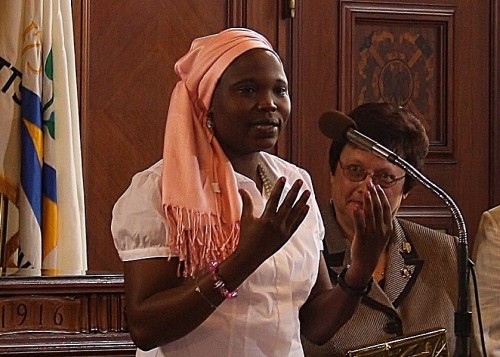“We are still suffering”: Darfuri activist Hawa Abdullah Salih
by Joe Edgar / June 22, 2012 / No comments
This time last year Hawa Abdullah Salih was imprisoned in Khartoum, Sudan, undergoing repeated torture and rape. The Sudanese government had accused her of dealing with foreigners and proselytizing Christianity to Muslim children. As a result, a death sentence hung over her head. In these conditions the 27 year old Salih was detained for over two months until international pressure secured her release on July 13, 2011. In March of this year Secretary of State Hillary Clinton presented Salih and nine other female activists with the International Women of Courage medal.
In Darfur, Western Sudan, Salih spoke out about the conditions in the Abu Shouq IDP (Internally Displaced Persons) camp where she and her family were placed in 2003 after conflict erupted between the Sudanese government and Dafuri Rebels. According to David Rosenberg, Director of the Pittsburgh Darfur Emergency Coalition, during the conflict “innocent civilians from the villages of Darfur were systematically targeted by the government of Sudan and its proxies.”
- The Pittsburgh Darfur Emergency Coalition
- Beginning in 2003, The Pittsburgh Emergency Darfur Coalition (PDEC) has rallied public support for action to end the genocide in Darfur. They also organize events in Pittsburgh to promote greater attention on this emergency. PDEC is calling attention to the mass killings and widespread rape and torture, combined with the destruction of villages and the displacement of more than two-million people that has been perpetrated in Darfur, Western Sudan. PDEC campaigned for Salih’s release and brought her plight to the attention of local and state leaders. Their combined effort joined with an international movement advocating for Salih’s release from prison.
Concerned about the health and education of women and children living in the IDP camps, Salih worked closely with the United Nations Development Program (UNDP) and other NGOs to try and improve the situation.
Sampsonia Way spoke with Salih on May 22, moments after she gave an elated speech to the Pittsburgh City Council, which she took as an opportunity to thank those in the Pittsburgh community who had petitioned for her release, including city council Rep. Mike Doyle (D-Forest Hills), and U.S. Sen. Bob Casey (D-Pa).
In this interview Salih talks about conditions in the IDP camp, her arrest and defamation at the hands of Sudan’s National Intelligence and Security Service (NISS), and her hope for democracy in Sudan.
On the morning of May 22 you were honored by the Pittsburgh City Council for your humanitarian work in Darfur. How do you feel?
I am very happy to have been invited to the meeting, because the Pittsburgh Darfur Emergency Coalition helped me and supported my case when I was imprisoned in Sudan.

Salih (center) is honored by Pittsburgh City Council members Darlene Harris (District 1, right) and Bill Peduto (District 8, left)
Take us back to the time before 2003, the year your village in northern Dafur was burned down and your family had to flee.
Our village was called Tina. It was in a peaceful area so we were very safe before the war started. There was good social interaction among the people there.
As far as my family, we were doing well. Comparatively we were financially well off; my father was a merchant and owned a large farm.
In our community, many of the women were educated. I had planned to move on to university before the war started but I had to halt my education during the war because the economic situation became very difficult and I am the oldest of nine.
What happened to your family when the genocide began?
Immediately after my grandmother—my father’s mother—died because of… She was very afraid.
When we were forced to leave the village, we went to Abu Shouq. My family was separated. My father was detained for four years. Two of my brothers were detained for one year each.
For men from our villages, the situation was difficult. In the beginning the Sudanese government kidnapped, imprisoned, and tortured them. The men who escaped could not return to the camps and have been fighting with the rebel movement.
The U.N. has consistently estimated the IDP population inside Darfur at over 2 million people with over 200,000 refugees across the boarder in Chad. What was your experience in the camp like like?
The conditions at the camp were hard. I witnessed the murder of a woman, which made me very angry and empowered me to act. I was also shot by a Sudanese soldier, a janjaweed. But on the other hand, NGOs and international humanitarian organizations arrived to organize the camps and house the displaced population of Darfur. That’s when I got in contact with them.
What is the status of your family? Are they still in Sudan in the IDP camp?
Yes, they are still in the camp. One of my brothers has graduated from Khartoum University. Two of them are in high school. But there has been a push to leave the schools because of safety. While I am abroad, the Sudan government continues to threaten my family. They say that I can’t live my life in any African country. My family is very worried; they say that I can’t go back.
And what do you think? Can you go back?
I feel that I must return in order to continue my work, but it is very difficult now. In Darfur, I had become an advisor to activist groups in the IDP camps. I provided them with information about the humanitarian crisis. Then in late 2008 the International Criminal Court (ICC) issued warrants for members of the Sudanese government. The government then stopped all assistance to NGOs and the situation for the people of Darfur has deteriorated.
My people are saying to me, “Hawa, you are our hope!”
Because of your work with U.N. officials and humanitarian NGOs—and especially for your advocacy for women and children in the camps—you were arrested three times, and kidnapped twice by Sudan’s National Intelligence and Security Service (NISS).
Yes. I was kidnapped and held for three weeks the first time. Then, they arrested me and transferred me from El Fashir to Khartoum. I was detained for about two and a half months. Nobody knew where I was. My case gained a high level of attention in the country, because the government is corrupt. There are many, many abuses. They said that I was converting Muslim children in the camps to Christianity. According to the Sudanese constitution, that crime is punishable by death.
The authorities took a picture of you with a Christian bible?
Yes. They put it in their publication. After I was arrested, NISS began talking to the media saying that I was very dangerous to Sudan and very dangerous to Islam. They sentenced me to death. The people in the peace camps in Darfur became very afraid. The situation directed a lot of negative attention toward my family as well.
Were you aware of the international support for your case while you were imprisoned?
I was, yes.
You’ve seen great suffering and devastation in your 28 years. How do you remain hopeful?
I have always been hopeful. My people in the camps know me and are as concerned for my life as I am for theirs. After I received the award from the U.S. State Department, many of the newborn girls in the camps were named Hawa. That gives me hope. My people are saying to me, “Hawa, you are our hope!” I have set an example for women.
What is your wish for Sudan?
We are demanding real freedom, real justice. Those who commit crimes must be brought before the International Criminal Court. I am for peace and an end to the killing. We are calling for democracy, for all Sudanese people to be afforded the same rights of citizenship. Sudan must become a country for all people, not just one ethnic group or party. For a long time Sudan was multi-religious, multi-cultural, and multi-ethnic. The Sudanese government began killing people in South Sudan 22 years ago. Ten years ago they started in Darfur. Now, they are moving on to other areas such as the Nuba Mountains. The Sudanese government’s intention is to destroy these people.
Some past honorees of the International Women of Courage award declined acceptance for fear of retribution in their home countries. This year, all ten nominees accepted the award. What is the benefit of your acceptance?
There are many benefits for my country–-especially for the people in the camps in Darfur who have suffered so much. After I was awarded, I received several calls from women at universities saying that they now feel that they have been empowered.
Women must participate in the movement; they must become active politically and socially in any way that they can. This is a good for the country. This is where our hope resides, even if isn’t clear at the moment in Sudan.
What is next for you as an activist?
I would like to establish an organization to directly help the victims of genocide and rape in Darfur. I want to help them through the psychological trauma. I want to interview the victims and record their narratives. Our issue must be understood and articulated clearly to the world: We are still suffering.





